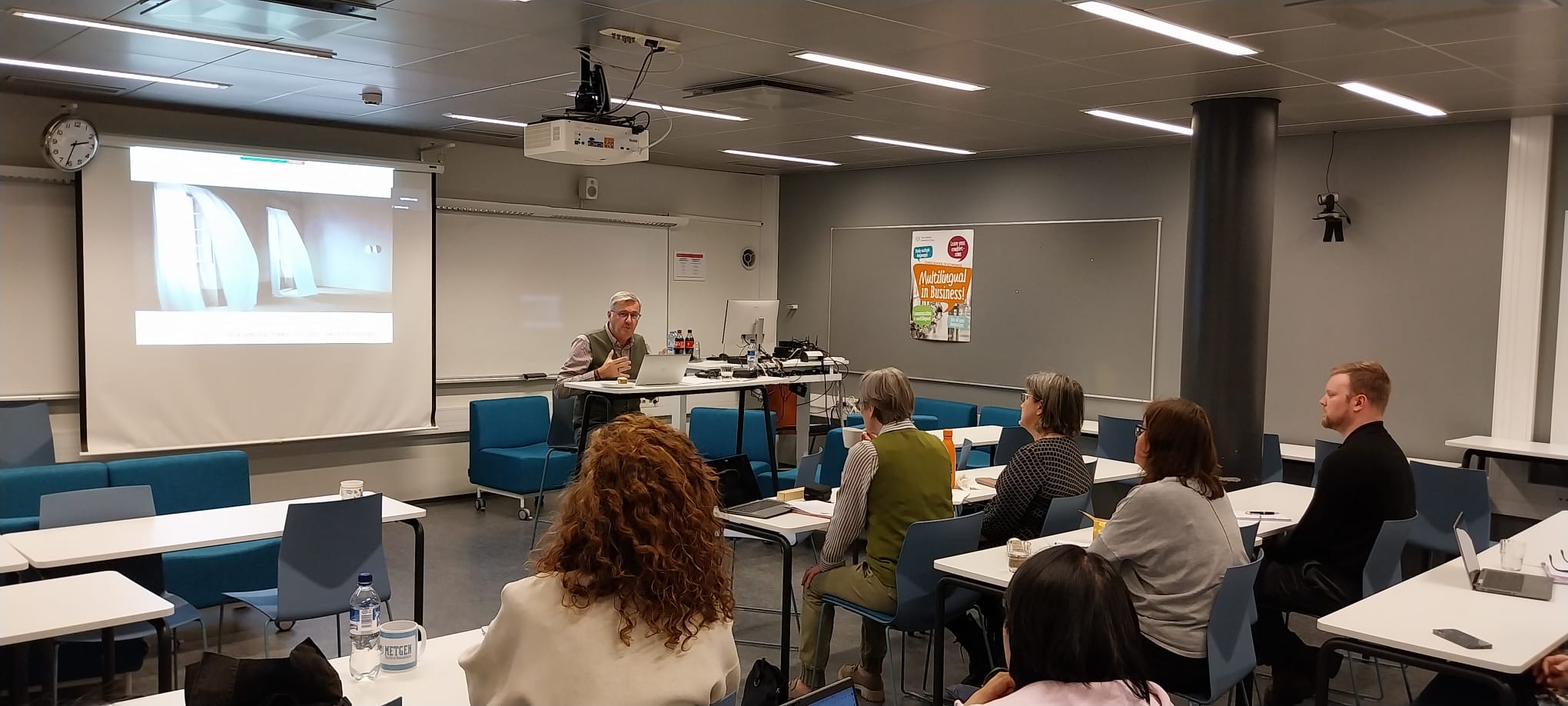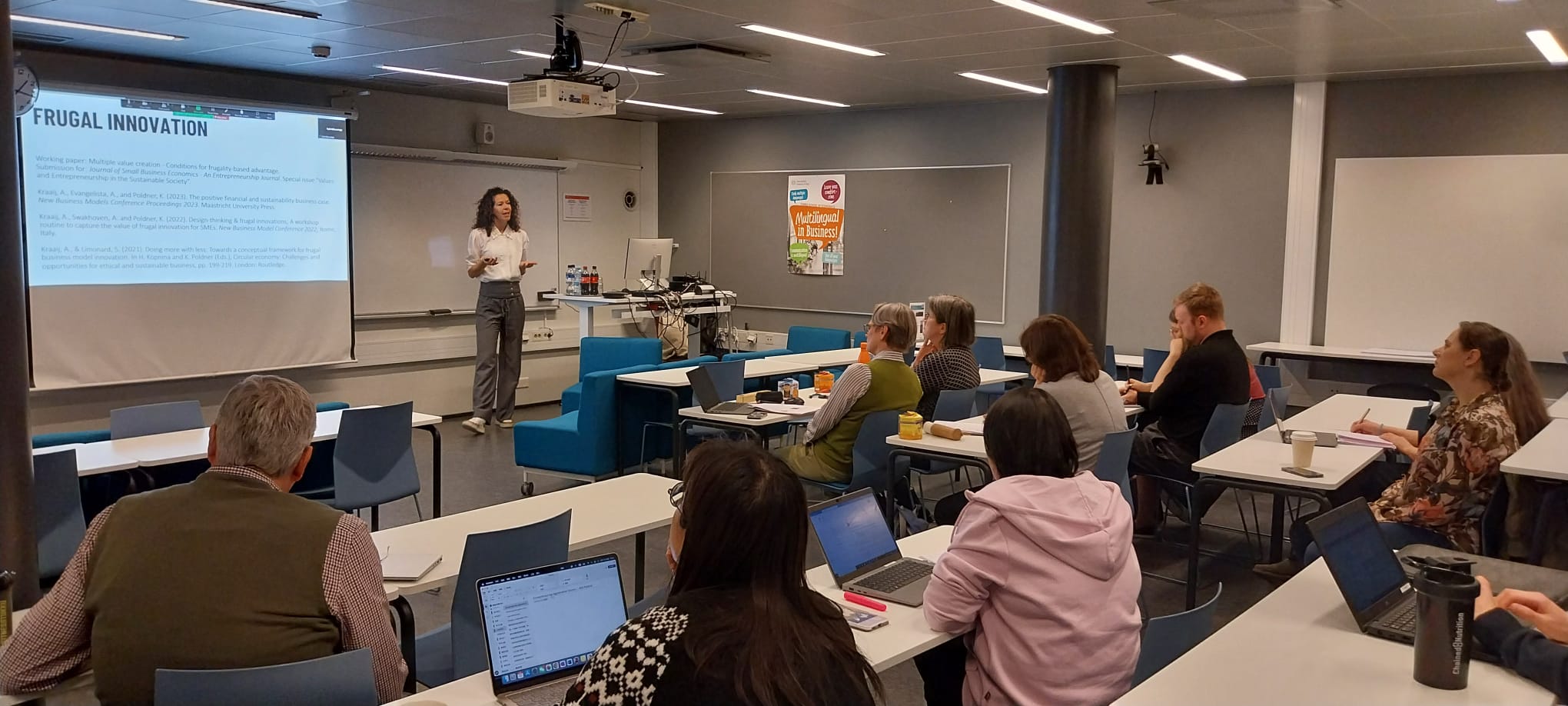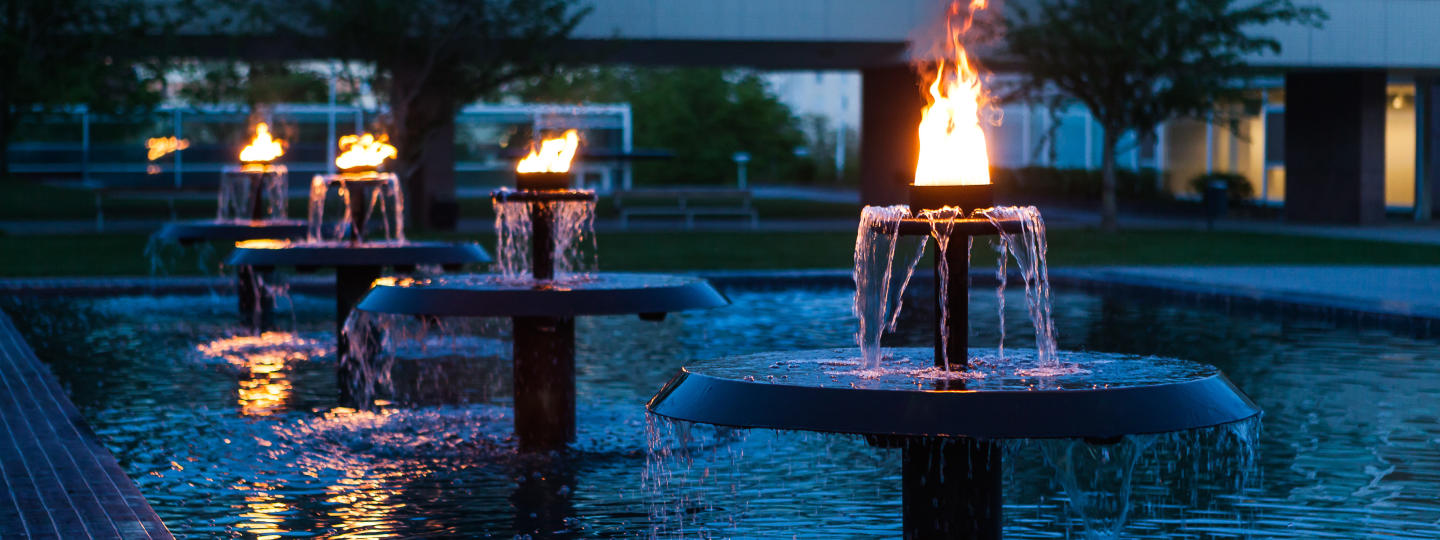Stakeholder collaboration
In Entrepreneurship we consider it highly important to engage entrepreneurs and other individuals from the working life to our entrepreneurship education. Therefore, we have already for several years nominated a handful of Entrepreneurs in Residence (EiRs) to serve as inspirational guest speakers and panelists in our courses. Currently we are proud to collaborate with the following EiRs: Hannu Aaltonen, CM-trader; Petri Hollmén, Founder and CEO of Lyyti Oy; Jussi Karttila, Founder and CEO of Zefort; Noora Keskievari, Co-founder and CEO of OneMind Dogs Oy; and Sari-Anne Poikkijoki, Founder and CEO of Åma Oy. The EiR come from different industries, disciplinary backgrounds and work in companies of different size ranging from self-employment up till more than hundred employees. The selected EiR as real-life entrepreneneurs serve as kind of role models to our students and provide multifaceted picture of entrepreneurship. Furthermore, they serve as ambassadors of TSE and its programmes outside the academia.
Furthermore, we continue to rely on expertise of Professors of Practice (PoP) in our teaching and research. Currently we have Dr. Laura Strömberg as a PoP in Entrepreneurship and Dr. Kari Huhtala in Co-operatives and mutual companies. They both make an important contribution by opening up the myths related to entrepreneurship and co-operatives respectively. Laura Strömberg, who started as our EiR in 2020, has highlighted the role of an entrepreneur when pursuing business growth. Her own experience as a founder and CEO of a growth company provides valuable first-hand insights to our students, and to our faculty. Similarly, our new PoP Kari Huhtala has stressed the importance of co-operatives as potential employers of business graduates as they employ more than 90 000 persons in Finland and have a turnover of about 42 milliard euros.
Thanks to our active EiRs and PoPs Entrepreneurship and our students are well informed of recent needs of the working life, particularly as to entrepreneurship and co-operatives. Importantly our EiRs and PoPs have also contributed to our research by suggesting some interesting issues to be studies, such as work-life balance and coping with work and well-being of entrepreneurs. Indeed, we are proud of our EiRs and PoPs and wish to continue with such collaborative programmes.
Read more about the EiRs here: Entrepreneurs in Residence | University of Turku
TSE Entrepreneurship Unit, together with the Kerttu Saalasti Institute (University of Oulu), presented the latest research findings to the Entrepreneurship Advisory Board, at a webinar held on August 27, 2024. The Board operates under the leadership of the Ministry of Employment and the Economy (MEE) and serves as a consultative body on strategic issues concerning entrepreneurship (additional information here; in Finnish). The advisory board brings the perspectives and feedback of entrepreneurs into the preparation process of the Finnish government. Of the advisory board members, 13 are entrepreneurs, and the other 10 members are from the state administration, universities, and the municipal sector. Professor Jarna Heinonen represents the advisory board from the TSE Entrepreneurship Unit with Senior Research Fellow Tommi Pukkinen as her alternate member.
In the webinar, researchers from both universities illustrated the diversity of entrepreneurship through six presentations, which can be accessed via the TEM website (here). Research conducted by the TSE Entrepreneurship Unit was exemplified through the latest updates on the topics of ‘Revenue Logics of the Creative Economy,’ presented by Senior Research Fellow Pekka Stenholm, ‘Gendered Structures of Entrepreneurship,’ presented by Professor Ulla Hytti, and ‘Entrepreneurship of Immigrants to Finland,’ presented by Project Researcher Satu Aaltonen.
All six presentations sparked numerous comments and questions among board members, and there was a unanimous agreement that such opportunities for dialogue between the Entrepreneurship Advisory Board and the research community are both necessary and beneficial for both parties.
Conferences
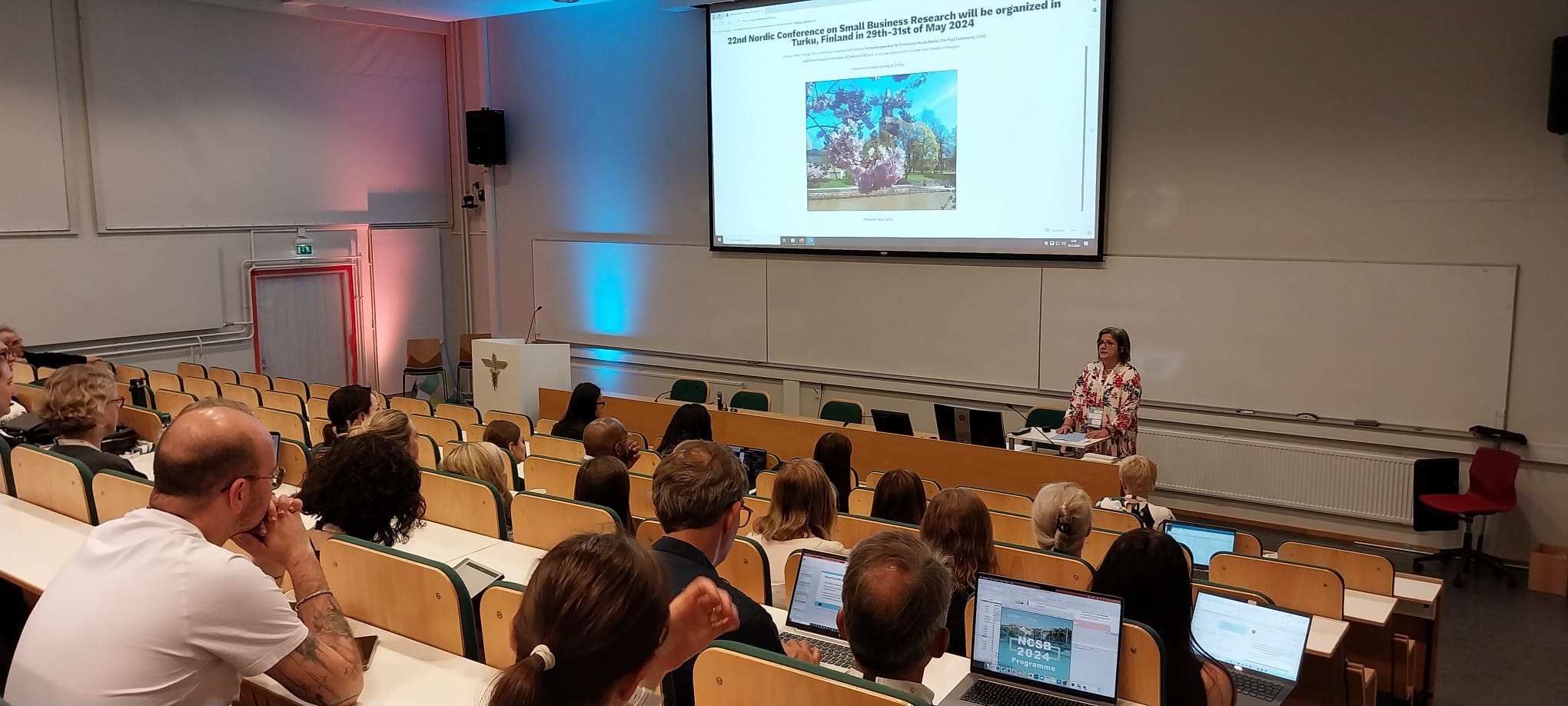
The 22nd Nordic Conference on Small Business Research (NCSB2024) was organized in Turku, Finland on May 29-31, 2024. NCSB conference is one of the oldest conferences in entrepreneurship and small business research in the world, with the first conference being held already in 1980. We were delighted to host 92 participants representing various regions of the Nordics and beyond. Together, they co-created an open atmosphere that encouraged the exchange of ideas between researchers within the field of small business and entrepreneurship.
Before the main conference, we organized a Doctoral Consortium with 20 prominent PhD researchers discussing various aspects of the PhD journey such as supervision, publishing, and research process. Participants had the opportunity to learn from the experiences of a recent PhD graduate and our Post-doc researcher Anna Elkina. The Doctoral Consortium was chaired by Professor Ewald Kibler from Aalto Business School supported by Professor Carina Lomberg (DTU, Technical University of Denmark), Professor Maija Renko (DePaul University, Chicago), Professor Jarna Heinonen (Turku School of Economics), Senior Research Fellow Pekka Stenholm (Turku School of Economics) and Professor Ulla Hytti (Turku School of Economics).
As the keynote speaker, Professor Renko discussed “Supporting Entrepreneurs from the Ground Up: Lessons from a Local Ecosystem of Entrepreneur Service Organizations.” The second keynote speaker, Professor Eero Vaara from Saïd Business School, University of Oxford, UK, explored “Narrative Perspectives in Organization and Entrepreneurship Research”. In addition, the plenary program included a “Meet the Editors” session, where participant could discuss and learn about publishing and the expectations of different entrepreneurship journals.
Overall, 101 abstracts were submitted to the conference either to one of the six special tracks or to the open track. The final programme featured 65 papers presentation. During the conference dinner at Manilla, three awards were given for outstanding papers. Two awards were given for the Best Doctoral Research Proposals: Julia Voss for her proposal: “From Macro to Micro: Unraveling the Interplay of Gender, STEM Entrepreneurship, and Innovation” and Simbarashe Takawira for his proposal: “Leveraging Network Ties: How Sharing Economy Firms address Formal Institutional Voids”. The Best Paper Award was given to Maud van Merriënboer and Patrizia Hoyer for their paper “Hero or Victim? Translocational (Be)-longings of a Woman Migrant Entrepreneur”.
The NCSB2026 conference will take place in Bodo, Norway.

NCSB2024 award winners together with Ulla Hytti, Ewald Kibler and Pekka Stenholm.
In October 2024, the Transforming Enterprise Education (TrEE) project hosted the Branching Out conference in Stockholm. The event showcased learning innovations developed within the project, while guest speakers shared their research, teaching, and entrepreneurial experiences, with a focus on art, social justice, and pedagogies of hope.
At the conference, Ulla Hytti and Anna Elkina presented and hosted a workshop that involved two key learning innovations developed within the project by UTU team: “Introducing Regenerative Business Modelling” and “Fostering Future Consciousness in Enterprise Education”.
The conference was held at the Stockholm School of Economics (SSE) and Stockholm University. Through a guided excursion around the campus, participants had an opportunity to explore SSE’s art collection and get insights in the school’s unique integration of art into teaching and learning.
The three-day event inspired thought-provoking discussions and active engagement. Participants learned together through “walking and talking”, interacted with social entrepreneurs, and engaged in conversations with SSE students, who shared their visions of the future. The conference covered a broad range of topics and teaching experiences to be introduced in entrepreneurship education – from empathy development and overcoming misunderstanding between people who live in different social realities to playing drums in classrooms for a deeper understanding of sustainable leadership.
Events
 The two-year HIWE project came to an end in September 2024.
The two-year HIWE project came to an end in September 2024.
To disseminate the results of the project to stakeholders and further develop the next steps that need to to be taken (the roadmap), the project organized an 'Open Forum' event in Helsinki on 12 September 2024. The Open Forum was focused on discussing how to promote highly skilled internationals employment, entrepreneurship, and workplace inclusion in Finland?? How to make their voices heard in policy making, service development, and workplaces?
The event included presentations from the project leaders (Tero Montonen, University of Eastern Finland & Ulla Hytti, University of Turku. In addition, the programme includes commentaries from stakeholder representatives (Laura Lindeman, Senior Director and Head of Work in Finland Unit at Business Finland, Vaida Kavaliukaité-Kaijanmäki, an international talent activist and Mika Mustakallio, Chairman and Co-founder at MORS and of REMMI). After the presentations the project results and the roadmap ahead was discussed in groups. The event was attended by 55 stakeholder representatives on-site but included also a livestream to on-line participants.
Livestream of the event can be found on YouTube.
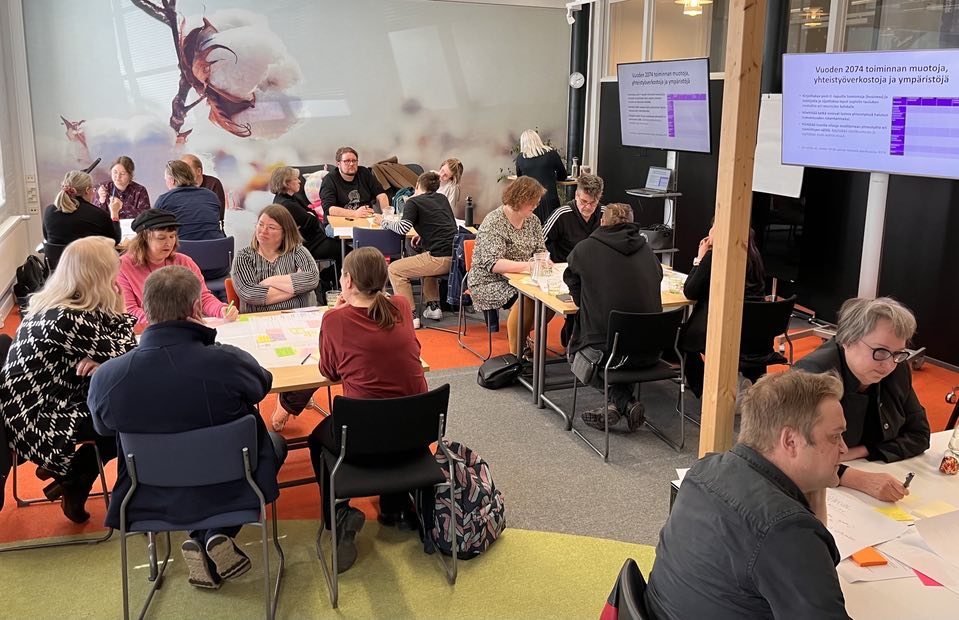
In 2024, ECOCRIN engaged local, regional and national actors and stakeholders in co-creation of modelling of the ecological approach to innovation policies for cultural and creative sectors by organizing several workshops in the three empirical case areas of the project and nationally. Three Heritage Futures Workshops were organized with local cultural and creative individuals and companies in Turku, Pori and Kuhmo to establish contextual understanding of the creative ecosystem actors’ specific needs across different cultural and creative sectors. Participants represented a wide array of cultural and creative sectors, including for instance, wood construction, literature, stories and games, visual arts, crafts, arts and crafts, design and the circular economy, music and dance. In each Heritage Futures Workshops, participants co-imagined different images of futures, and co-created futures skills needed today – futures heritages – to get to desirable futures of ecosystems. Moreover, ECOCRIN project organized Futures Literacy Laboratory workshop to identify the relationships between the local creative ecosystem needs and existing cultural and innovation policies.
The findings from the workshops suggest that the following current ecosystem needs are crucial in order to achieve a sustainable and innovative future of creative ecosystems: breaking the unsustainable creative deal, more collaboration beyond the creative ecosystem, more collaboration within the creative ecosystem, lower threshold for experimenting entrepreneurship, and more opportunities for diverse grassroot initiatives. The required skills to solve current ecosystem needs are related to collaboration, societal, entrepreneurial, and sustainability skills.
Towards the end of the ECOCRIN project, it combines the findings from workshops, interviews and policy analyses in order to design a model for innovation policies for cultural and creative sectors. The final outcome of the ECOCRIN project is a road map toward sustainable and innovative creative ecosystems via innovation and cultural policies in Finland.
In April, the Entrepreneurship unit hosted a research seminar titled “Queering – and Queries of – Our Thinking About the Futures We Envision.” The event welcomed Professor Chris Steyaert from St. Gallen University (Switzerland) and Professor Kim Poldner from The Hague University of Applied Sciences and the University of Groningen (Netherlands), who presented their insights on entrepreneuring as a focus and queering as a method in entrepreneurship studies.
Professor Kim Poldner's presentation “Entrepreneuring Regenerative Futures” focused on the concept of regenerative business and its foundations. She questioned the traditional separation between humans and the environment, advocating for a symbiotic vision of entrepreneuring that fosters mutual flourishing.
In his talk, “Queering Entrepreneurship: A Question(ing) of Method,” Professor Chris Steyaert explored ontological questions and revisited methodological approaches in entrepreneurship studies. Reflecting on his own research journey, he shared vulnerable moments from his life, offering a deeply personal perspective on how queering can challenge established ways of thinking in the field.
